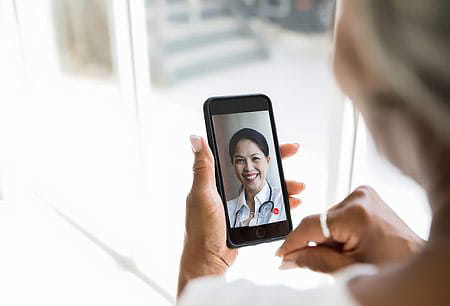Colorectal screenings and treatment: Why your care shouldn’t stop
A colorectal surgeon explains why prevention — still — is key and what we’re doing to keep you safe.
When it comes to your colon health, getting prompt care and routine screenings are crucial for colon cancer prevention.
Although COVID-19 required us to postpone routine screenings, like colonoscopies, and make some changes to care, our colorectal team is here to keep your colorectal health on track throughout the pandemic — both virtually and at in-person appointments.
Here’s how we’re helping you get the colorectal care you need with preventative screenings and virtual appointments.
Colorectal appointments and surgeries during COVID-19
Throughout the pandemic, our colorectal surgery team has continued seeing patients in our hospitals and clinics. But rather than seeing everyone in-person, office appointments have been reserved for those with urgent colon and rectal problems, signs or symptoms of colon or rectal cancer (also called colorectal cancer) or those actively battling cancer. These were necessary steps to help slow the spread of COVID-19 and keep everyone safe.
“If someone has a positive result returned on a Cologuard test or is experiencing rectal bleeding, anemia or a change in their bowel function, we’d like to see them in-person for a visit,” explains Thomas Erchinger, MD, colorectal surgeon at Geisinger Wyoming Valley Medical Center.
We’re also beginning to reschedule routine visits and screenings for everyone — carefully and with safety measures in place.
“If you’re having a procedure and need a driver, we ask that your driver waits in the car until the end of your appointment, if possible,” says Dr. Erchinger.
If that’s not possible, our staff makes sure each person is wearing a mask and social distancing protocols are followed in our waiting areas.
“We also screen every person before they come into the building — patients, staff and any visitors,” he adds. “This helps identify those who may have come in contact with a person who had COVID-19 or are experiencing symptoms.”
Once you check in for your appointment or procedure, we’ll bring you straight back to your exam room where you’ll be screened once again for symptoms of respiratory infection.
If you’re scheduled for a colonoscopy or surgical procedure, our teams are ready and following strict guidelines to maintain everyone’s safety.
“We continue to wear personal protective equipment, or PPE, for all procedures, which is something we’ve done before COVID-19,” explains Dr. Erchinger.
Virtual appointments for colorectal care
While many appointments in colon health benefit from in-person care, telemedicine appointments are being scheduled whenever possible — especially for anyone considered low-risk for developing cancer or complications.
For instance, many common symptoms, such as minor bleeding, pain or irritation, can be initially treated with bowel regimens, local care and topical medications. And these can be prescribed during a telemedicine appointment. These video or phone visits allow you to virtually connect with your doctors within the comfort of your own home.
Follow-up care is provided through virtual appointments to monitor symptoms and determine if an in-person visit is needed. “We’re also continuing to provide all necessary care and treatment in-person, including cancer care, lab tests and X-rays,” says Dr. Erchinger.
When to schedule an appointment with a colorectal specialist
If you’ve had a routine screening or colorectal appointment postponed but believe your situation has changed or you’re experiencing new symptoms, reach out to your doctor. “You know what’s normal for you better than anyone else does,” says Dr. Erchinger. “Call your doctor if you think something is wrong, and we can get you in for an appointment sooner.”
If you’re looking to take preventive steps in your colon health at home, Dr. Erchinger’s advice is to follow a healthy, high-fiber diet and drink plenty of fluids.
But your best defense in cancer prevention? Having routine colorectal screenings, or a colonoscopy. Most people should start having these at age 50 if they’re considered low or average risk. However, if you experience rectal bleeding, stomach pain or have a family history of colon cancer, talk with your doctor about having your screening sooner.
New safety measures for surgery and appointments
Whether you come to one of our hospitals or offices for routine screenings, surgery or colorectal cancer care, keeping you safe is our top priority. And you may notice things look a little different. That’s because we’re taking extra measures to keep you safe, from rearranged waiting and exam rooms to masked and gloved providers.
Here are some of the extra measures we’re taking to keep you safe:
- Isolating those with COVID-19 or related symptoms in separate, designated areas and units.
- Screening every person for respiratory symptoms when they come in — patients, visitors and employees. This includes screening for symptoms of respiratory infection (fever, runny nose, cough and shortness of breath) and checking temperatures, which are taken using no-contact infrared thermometers.
- Requiring staff, patients and visitors to wear a mask at all times. Wearing a mask helps protect others around you — and yourself — from the coronavirus. All of our medical personnel are wearing masks and taking extra steps to protect our patients, communities and themselves.
- Limiting the number of people in our waiting rooms and expanding the space between chairs.
- Arranging our exam rooms to reduce unnecessary contact with high-touch surfaces.
- Deep cleaning our care sites between patients and multiple times throughout the day.
- Limiting the number of visitors in our hospitals and clinics.
Next steps:
Upcoming appointment? Learn more about what we’re doing to keep you safe
Learn more about colorectal surgery
Schedule a telemedicine appointments

Telemedicine video visits
See your doctor from the comfort of home — from routine care to specialty care
Get virtual care nowCOVID-19 updates: Visit Geisinger's Coronavirus Resource Center for the latest information and helpful resources.
